Call back in 48 hours: Difference between revisions
mNo edit summary |
mNo edit summary |
||
| Line 100: | Line 100: | ||
[[Category:RCMP impeded investigation]] | [[Category:RCMP impeded investigation]] | ||
[[Category:RCMP spread misinformation]] | [[Category:RCMP spread misinformation]] | ||
[[Category:RCMP delays]] | |||
Revision as of 17:15, 12 May 2024
“Call back in 48 hours...”—Nanaimo RCMP to Lisa's mother
July 1, 2002 11:30am
Summary
When Lisa's mother first called Nanaimo RCMP to report Lisa's disappearance, RCMP staff refused to accept the report, and advised her to call back in 2 days.
This was despite the fact that no police force in Canada has ever had a "waiting period" before a missing persons report can be filed, and, in fact, research clearly shows that the first 72 hours are the most crucial to a missing persons investigation.
Detail
Parent's efforts before calling RCMP
Lisa's parents had reason to be concerned; it was not without due diligence that the decision was made to contact the RCMP.
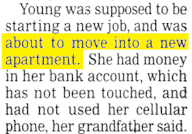
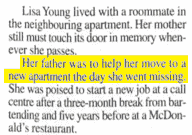
Lisa had failed to show up for early-morning plans with her father,[3] who was going to help her move into her new apartment using his Purolator Courier truck.[1][2] The move was something Lisa had been looking forward to,[4] and she had pre-paid a deposit on her new unit. As Lisa was normally extremely reliable, her parents were immediately very concerned.[5][6][7]
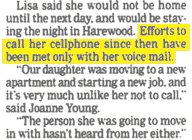
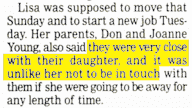
Calls by Lisa's mother to her cellphone were forwarded directly to voicemail.[3] This added concern as Lisa had purchased the cellphone proactively/primarily so that her parents could always contact her (as she'd always been very close to her parents).[8] Lisa always carefully ensured the phone was charged, and she had never powered it off.[9]
![She called every number in [Lisa's phone book]](/w/images/thumb/b/b5/Nw20150501b.png/350px-Nw20150501b.png)
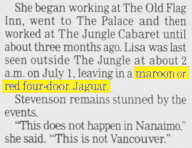
Lisa's parents retrieved her address book and called "all" of her many friends.[10] Multiple friends said they saw her the previous night, in conversation outside the bar with the unknown male driver of a maroon Jaguar.[11] Others reported seeing her at a houseparty on Nanaimo Lakes Road[12], or leaving a second party around the Cathers Lake area, in the maroon Jaguar.[13] But nobody knew where Lisa was now.[14]
Contacted Police
![[Lisa's parents] called police at 11:30am on July 1.](/w/images/4/43/Ndn20020710a.png)

By this point, Lisa's parents were frantic.[10]
On Monday, July 1st, 2002 (Canada Day) at about 11:30am[5], Joanne Young (Lisa's mother) called the Nanaimo RCMP detachment to report that her daughter was missing.[10]
Report refused by RCMP
![[RCMP] said they needed her to be gone 48 hours [before a report could be filed]](/w/images/e/e7/Hss20190624b.png)
RCMP staff told Lisa's mother that a report couldn't be filed until 48 hours after Lisa was last seen.
She was advised to call back to file the report after 2 days had passed.[3][9][14][10]

Policy & Research
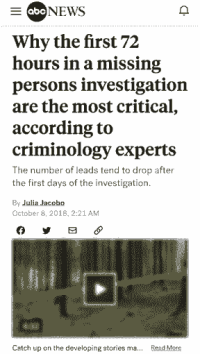
While once a common myth, no police force in Canada has ever had a policy requiring a "waiting period" before submission of a missing persons report.[16]
Research shows that the first 72 hours are actually the most critical time frame of a "missing persons" investigation.[15][17]

See also
- Next ➜ RCMP said
Call back in 5 days
- List of all blunders on Lisa's List of Fifty
- Timeline: July 1, 2002
- RCMP vs Crime Stoppers
Sources
- ↑ 1.0 1.1 Nelson Bennett, Nanaimo Daily News (July 25, 2002),
Lisa's kin follow psychic tip
(source) - ↑ 2.0 2.1 Jim Gibson, Times Colonist (Apr 4, 2004),
The case Nanaimo can't forget
(source) - ↑ 3.0 3.1 3.2 3.3 Paul Walton, Nanaimo Daily News (July 4, 2002),
Parents fear daughter the victim of foul play
(src) - ↑ Jason Proctor, Vancouver Province (Sep 2, 2002),
Where is Lisa-Marie?
(source) - ↑ 5.0 5.1 5.2 Paul Walton, Nanaimo Daily News (July 10, 2002),
Police fear local met with foul play
ndn20020710 - ↑ Jolene Rudisuela, Capital Daily (May 5, 2021),
More people go missing in BC than anywhere else in Canada. No one knows why
(source) - ↑ Fort McMurray Today (July 10, 2002),
Foul play suspected in missing B.C. woman
(source) - ↑ 8.0 8.1 Paul Walton, Nanaimo Daily News (July 9, 2002),
RCMP keep searching for woman
(source) - ↑ 9.0 9.1 9.2 Eric Plummer, Ha-Shilth-Sa (June 24, 2019),
Legacy of Lisa Marie Young to hang in Tofino
(source) - ↑ 10.0 10.1 10.2 10.3 10.4 10.5 Allison Crowe, NWAC (May 1, 2015),
Story Telling - Lisa Marie Young (PDF)
(source) - ↑ 11.0 11.1 Paul Walton, Nanaimo Daily News (July 12, 2002),
Woman's disappearance leaves friends perplexed ...rumours unfounded
(source) - ↑ Paul Walton, Nanaimo Daily News (May 29, 2003),
When sadness turns to anger
(source) - ↑ Vancouver Sun (Feb 26, 2011),
Nanaimo RCMP appeal for help
(source) - ↑ 14.0 14.1 14.2 MP Paul Manly, Parliament, Ottawa (Oct 8, 2020),
House of Commons Debate #12 - October 8, 2020 (43-2) at 1525
hoc20201008 - ↑ 15.0 15.1 Julia Jacobo, ABC News (Oct 8, 2018),
Why the first 72 hours in a missing persons investigation are the most critical
(source) - ↑ 16.0 16.1 Canadian Centre for Information on Missing Adults (Dec 1, 2012),
Quick facts about reporting a missing adult in Canada - CCIMA
(source) - ↑ NIWRC, "Quick Reference Guide for What to Do in the First 72 Hours" (Brochure)